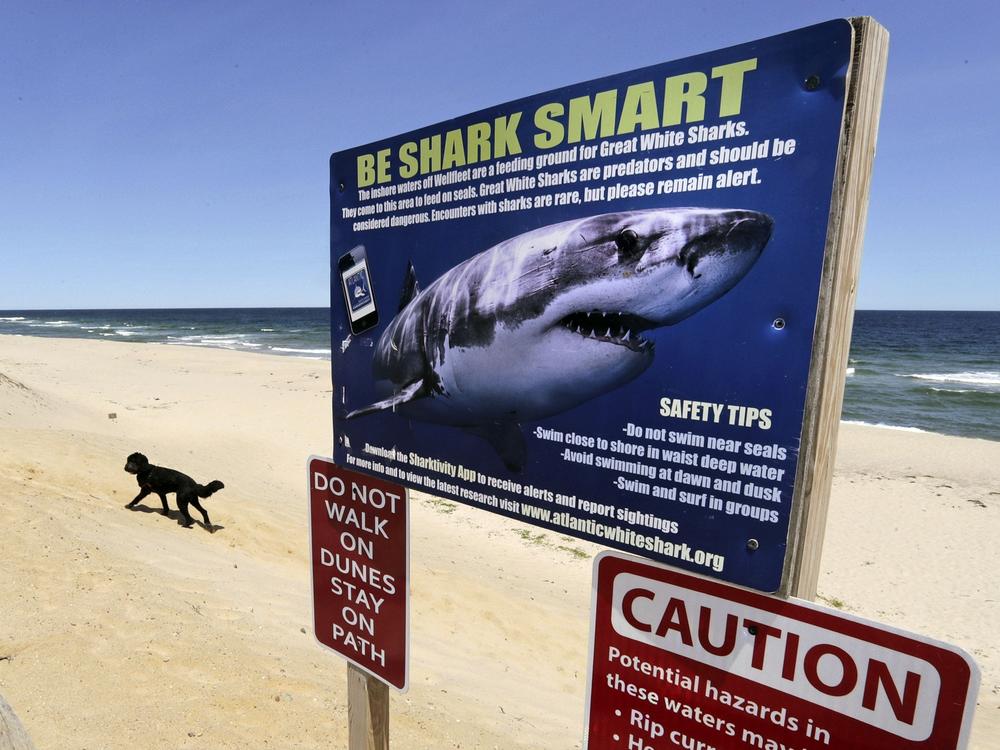Section Branding
Header Content
2 Australian States Say Their Sharks Will No Longer 'Attack.' They Will Only 'Bite'
Primary Content
Updated July 21, 2021 at 1:12 PM ET
Shark Week may never be the same again: Two Australian states — Queensland and New South Wales — have softened their tone when it comes to the language of reporting shark attacks, opting for a little more nuance.
From now on, sharks will "bite," not "attack," and when humans have a less-than-ideal meeting with them, it will be referred to as an "encounter" or an "incident."
In case you're wondering whether this is yet another example of government bowing to political correctness, it turns out that the states are simply falling in line with scientific thinking on the subject.
"[It] helps dispel inherent assumptions that sharks are ravenous, mindless man-eating monsters," Leonardo Guida, a shark researcher at the Australian Marine Conservation Society, told the Sydney Morning Herald recently.
The change comes in two states where "attacks" are most common
Queensland and New South Wales have had the highest number of reported shark attacks in Australia since 1700, according to data compiled by the Florida Museum's International Shark Attack File.
At a shark symposium in May, a senior Queensland official said the state government prefers to use "bites" over "attacks." The state's Department of Agriculture and Fisheries was quoted by the Herald as saying that while it has "no formal direction" for how to describe such situations, "some people may just have a personal preference for the language they use."
In New South Wales, the department of public information says it's "respectful that each incident is best described by the individual involved," a spokeswoman said, according to the newspaper.
Researchers say language can make it harder to protect threatened species
Christopher Pepin-Neff, a senior lecturer at the University of Sydney who studied the language used around shark encounters, notes that before the 1930s in Australia, they were described as "shark accidents."
In a 2011 article in Slate, Pepin-Neff said he thought it was time to retire the "shark attack" phrase.
"Such language creates a one-dimensional perception of these events and makes protecting threatened shark species more difficult. After all, why care about an animal that wants to eat us?" he wrote.
Shark Trust, an organization based in the United Kingdom and dedicated to "safeguarding the future of sharks through positive change," contends that media reports of shark bite incidents "use highly emotive, often misleading language."
"[S]uch language can also 'criminalise' sharks in the mind of the public, with terms such as 'man-eater' or 'rogue shark' incorrectly implying an intent to target or harm humans."
The suggested change in language has garnered some pushback: One individual whose profile says they are based in the Australian city of Darwin tweeted: "They say sharks that bite humans do so by mistake thinking your some type of seal or fish. Sadly too many people in Australia and around the world have lost their lives due to shark mistakes. Meanwhile getting your arm bitten by a shark will still feel like an 'attack' to me."
No matter what you call it, "bites" are exceedingly rare
Sharks killed 10 people worldwide in 2020, in what was considered an unusually deadly year for shark attacks.
The vast majority of human-shark encounters have a much happier ending — at least for the human — scientists say. And the lifetime risk of death by shark is far lower than dying from just about anything else you can imagine (including, yes, far lower than being killed by lightning).
In any case, of the more than 500 shark species, only about 30 are "reported to ever attack a human," according to the Florida Museum.
"We humans tend to think the world revolves around us," Micah Sklut, the owner of Surf Captain, a national surf forecasting site and a surfer himself, tells NPR.
"Sharks are just being sharks, and generally couldn't care less about 'attacking' humans," he says. Even so, "If you live in Florida or other sharky waters, as a surfer, you certainly have to be more aware of the marine environment you are choosing to enter."
Overall, the U.S. has more shark encounters than Australia, with Florida topping the list of states, followed by Hawaii and California.
While Florida's Fish and Wildlife Conservation Commission still refers to them as "shark attacks" on its website, California's Department of Fish and Wildlife and Hawaii's Department of Land and Natural Resources both refer to them as "incidents."
Copyright 2021 NPR. To see more, visit https://www.npr.org.

